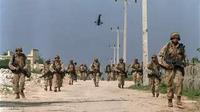-
License plate readers still to reach their full potential
Systems which automatically read automobile license plates have the potential to save police investigative time and increase safety, but law enforcement officials must address issues related to staffing, compatibility and privacy before the technology can reach its full potential, according to a new study. Addressing these issues will require a clear understanding of the current and potential value of the systems to criminal justice agencies.
-
-
About 120 U.S. military advisors have been operating in Somalia since 2007

About 120 U.S. military advisors have operated in Somalia since 2007, and the Obama administration plans to expand its security assistance to help the country fight threats by the al-Qaeda-backed militant group, al-Shabaab. This figure is higher than what the Pentagon, in an announcement in January, referred to as the “handful” of advisors it had sent to Somalia in October 2013.
-
-
An ISIS caliphate is bad news for Iraq, Syria and everywhere else

After the death of Osama Bin Laden in May 2011, the global jihadist movement seemed to have become fragmented and considerably weakened. The impressive victories of ISIS in Iraq and the practical reactivation of the concept of the “caliphate” by ISIS leader Abu Bakr al-Baghdadi are particularly worrying as they creates a new unifying idea for disparate jihadist groups around a common strategic project. Since Bin Laden’s death, these groups were fragmented, but they might now be able to connect and share an ideology — and, probably, funding given the wealth of the “new caliph.” The “Caliphate Utopia” may reveal to be also a much more efficient tool for jihadist recruitment, especially among young Westerners. This change might point to the marginalization of the leader of al-Qaeda, Ayman al-Zawahiri, an Egyptian, who has not been able to impose himself after Bin Laden’s death. But at the same time it indicates the end of the fragmentation and the beginning of the reunification of jihadi groups around the world within an even more dangerous organization. The global war against terror may finally start.
-
-
There has been a 70% rise in civilian casualties from IEDs around the world since 2011
There has been a dramatic rise in civilian casualties from improvised explosive devices (IEDs) over the last three years, new data show. Numbers compiled from 500 English-language media reports show there was a 70 percent rise in the number of civilian casualties globally from IEDs like car bombs and suicide vests last year compared to 2011. In 2011 13,340 civilians were killed and injured by IEDs. 2013 saw this number shoot up to 22,735. In total, there have been over 60,000 deaths and injuries from IEDs in 2011-13, with civilians accounting for 81 percent of these casualties. IEDs were not limited to Iraq and Afghanistan. There were IED incidents in sixty-six different countries and territories in the last three years. Of these countries, eight — including Pakistan, Nigeria, and Thailand — saw over 1,000 civilian casualties of IEDs.
-
-
NSA shelved collection program which could have prevented 9/11 attacks: Critics
Fourteen years ago the NSA research unit developed a collection program called Thin Thread which, its authors say, could have detected the perpetrators of the 9/11 attacks and prevented it. Critics of the program agreed it was a good program, but that it picked up more Americans than the other systemsthen being considered, and was thus deemed too invasive of Americans’ privacy. In the fall of 2000 General Michael Hayden, then-director of the NSA, decided against the program largely because of the legal implications.
-
-
Current White House drone policy a “slippery slope”: Report
An 81-page report, released last Thursday by the Stimson Center and authored by a bipartisan panel of former intelligence and defense officials, warned that the present targeted drone strike policy could represent a “slippery slope” toward never-ending war. The report stresses that drone operations should always be “having a positive effect on U.S. national security and not trading short-term gains for more negative longer-term strategic consequences.”
-
-
DHS top priorities: addressing terrorism, cyberthreats, and extreme weather risks
In its second quadrennial review, DHS outlined the department’s efforts to enhance the five homeland security objectives detailed in the first review, issued in 2010. Combating terrorism remains DHS’s primary mission, but recent disasters, including the Deepwater Horizon oil spill in 2010, Hurricane Sandy in 2012, and domestic terrorism events such as the Boston Marathon bombings in 2013, along with cyberthreats against the nation’s infrastructure, have led the agency to adopt a risk-based approach to significant threats from both terrorism and natural disasters.
-
-
Proposed bill would extend tax exemption to civilians in combat zones
A bipartisan bill introduced in May would extend the same tax credit available to military personnel serving overseas to civilian federal employees serving in combat zones. Most civilians working abroad in combat zones are employees of the Defense and State departments, the intelligence community, and the U.S. Agency for International Development.
-
-
Dozens killed in north Nigeria as Boko Haram car bomb explodes in marketplace
Dozens killed after Boko Haram car bomb attack in north-eastern city of Maiduguri, the birthplace of Islamist militant group. In May 2013 the Nigerian president announced a state of emergency in three north-eastern states, and the Nigerian military deployed tens of thousands of troops to the area in an effort to fight Boko Haram. That campaign has been a complete failure. The extremists have been attacking with more frequency and deadliness in recent months, defying assurances by Nigerian security forces and government that they were getting the situation under control.
-
-
Congress debates BioShield funding while medical schools debate bioterrorism training
Just as researchers urge medical schools across the United States to include bioterrorism preparedness courses in their curricula, Congress is debating whether to continue spending on Project Bioshield, an initiative launched in 2004 to incentivize otherwise unprofitable research on treatments for rare outbreaks or bioterror agents such as anthrax and botulinum toxin.
-
-
Privacy advocates worried about new Senate cybersecurity bill
Privacy groups are concerned that a new Senate cybersecurity bill could give the NSA unrestricted access to personal information of Americans. The Cybersecurity Information Sharing Act (CISA), a counterpart to the Cyber Intelligence Sharing and Protection Act (CISPA) which passed the House in 2013, would create a “gaping loophole in existing privacy law,” several privacy advocacy groups wrote in a letter to lawmakers.
-
-
Jury selection begins in trial of two friends of Boston Marathon bomber Dzhokhar Tsarnaev

Azamat Tazhayakov and Dias Kadyrbayev, two friends of Boston bomber Dzhokhar Tsarnaev, are set to go on trial on charges of impeding the investigation into the deadly attack. Opening statements are scheduled for 7 July. Law enforcement says Tazhayakov and Kadyrbayev admitted they took Tsarnaev’s backpack from his dormitory room three nights after the bombing after they saw photographs of Tsarnaev on the news identifying him as one of the suspects. The backpack contained fireworks that had the black powder scooped out.
-
-
U.S. needs better intelligence cooperation with African states for effective counterterrorism strategy
The U.S. focus on counterterrorism efforts in Africa will require forming long-term partnerships with nations, an all-hands-on-deck commitment from all U.S. military branches, and a strong investment in intelligence, and surveillance technologies to face significant challenges created by the continent’s size and scope. Forming intelligence partnerships with Africa’s fifty-four countries, all with their own civil and military traditions, mixed with multiple languages and cultures is complex.
-
-
Drones are cheap, soldiers are not: a cost-benefit analysis of war
Cost is largely absent in the key debates around the use of unmanned drones in war, even though drones are a cost-effective way of achieving national security objectives. Drones will never completely replace soldiers, but the drone-vs.-human being debate is becoming less important in the current strategic climate. The operating environments where drones are deployed — countries such as Pakistan, Somalia and Yemen — do not emphasize “hearts and minds” strategies where the human element has traditionally been valued as a force multiplier. Instead, objectives in these countries involve attacks on specific individuals, with operational data obtained by signal intelligence beforehand. Human contact becomes even less desirable given that a key tactic of combatants in these weak states is attrition with the aim of creating low-level civil conflicts. The end goal of these actions is to inflict high economic costs to the adversary. As a result, this remote and analytical method of engaging militarily leads to substantial cost efficiencies.
-
-
Obama administration wants $500 million to train, equip moderate Syrian rebels
The Obama administration is planning to escalate U.S. involvement in the Syrian civil war, and has asked Congress for $500 million for the U.S. military to train and equip moderate Syrian rebels. The training program would be the most significant action yet by the United States in the conflict in Syria. Yesterday’s (Thursday) request to Congress comes as the administration is looking for effective alternatives to the jihadist ISIS which is now in control of large swaths of Syria and Iraq. The $500 million request is separate from the $5 billion Counterterrorism Partnerships Fund, of which some $1.5 billion would go toward counterterrorism efforts in countries around Syria — Jordan, Lebanon, Turkey, and Iraq. The president also wants to set aside $500 million to “address unforeseen contingencies” in counterterrorism, which administration officials said was a reference to developments in Iraq.
-
More headlines
The long view
What Does Netflix’s Drama “Adolescence” Tell Us About Incels and the Manosphere?
By Lewys Brace
While Netflix’s psychological crime drama ‘Adolescence’ is a work of fiction, its themes offer insight into the very real and troubling rise of the incel and manosphere culture online.
A Shining Star in a Contentious Legacy: Could Marty Makary Be the Saving Grace of a Divisive Presidency?
While much of the Trump administration has sparked controversy, the FDA’s consumer-first reforms may be remembered as its brightest legacy. From AI-driven drug reviews to bans on artificial dyes, the FDA’s agenda resonates with the public in ways few Trump-era policies have.
The Center Can Hold — States’ Rights and Local Privilege in a Climate of Federal Overreach
As American institutions weather the storms of executive disruption, legal ambiguity, and polarized governance, we must reexamine what it means for “the center” to hold.
How to Reverse Nation’s Declining Birth Rate
By Alvin Powell
Health experts urge policies that buoy families: lower living costs, affordable childcare, help for older parents who want more kids
Foundation for U.S. Breakthroughs Feels Shakier to Researchers
By Max Larkin
With each dollar of its grants, the National Institutes of Health —the world’s largest funder of biomedical research —generates, on average, $2.56 worth of economic activity across all 50 states. NIH grants also support more than 400,000 U.S. jobs, and have been a central force in establishing the country’s dominance in medical research. Waves of funding cuts and grant terminations under the second Trump administration are a threat to the U.S. status as driver of scientific progress, and to the nation’s economy.
The True Cost of Abandoning Science
By Steven R. Furlanetto
“We now face a choice: to remain at the vanguard of scientific inquiry through sound investment, or to cede our leadership and watch others answer the big questions that have confounded humanity for millennia —and reap the rewards.”
